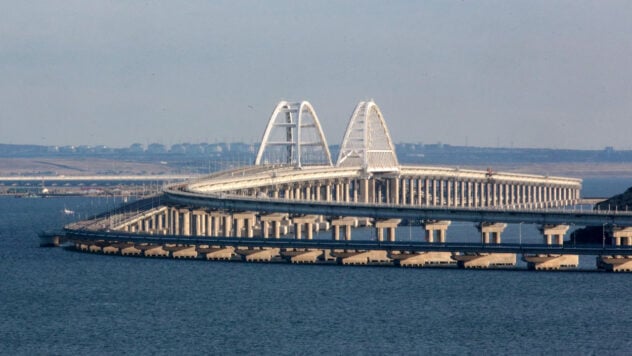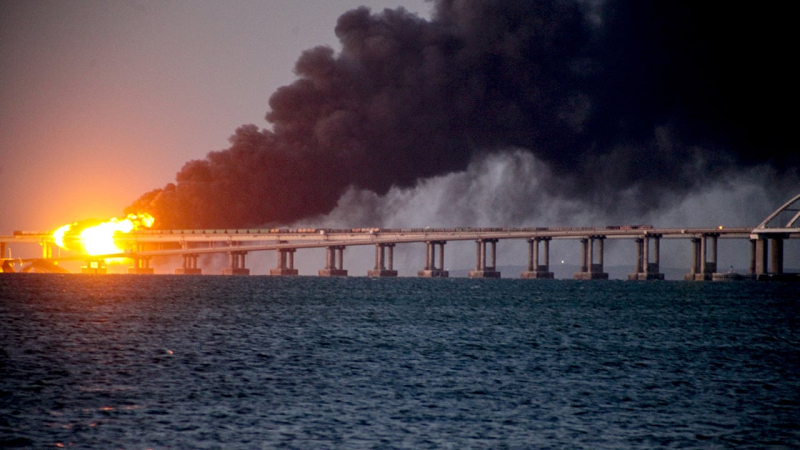
Russia is looking for alternative ways to access temporarily occupied Crimea amid attacks by the Ukrainian Armed Forces on the Kerch Bridge. The occupiers are considering the possibility of building an underwater tunnel that would connect the Ukrainian peninsula with the territory of the Russian Federation.
This information was published by The Washington Post, citing data “intercepted by Ukrainian intelligence services.”
The article states that Russian and Chinese businessmen with connections to the government held a secret discussion about plans to build an underwater Russia-Crimea tunnel.
The Russian Federation hopes to create a transport route that will be protected from attacks from Ukraine.
Currently watching
According to the publication, negotiations took place at the end of October. They are provoked by the growing concern of the Russian Federation regarding the safety of the bridge, illegally built across the Kerch Strait. It is a key logistics route for supplying the Russian army.
At the same time, the Kerch Bridge has already been damaged twice during attacks – on October 8, 2022 and July 17, 2023. It remains a legitimate and vulnerable target for Ukrainian forces.

Photo: Getty Images
Negotiations on the construction of a tunnel indicate the Russian Federation’s intentions to maintain control over the occupied peninsula. They also signal Moscow's growing dependence on China.
Chinese participation in tunnel negotiations
WP claims that one of the largest construction companies in China has expressed its readiness to participate in the construction of an underwater tunnel from the Russian Federation to Crimea. The publication refers to intercepted emails “provided by Ukrainian officials.”
“The authenticity of the messages was confirmed by other information obtained by The Washington Post, including company registration files that show that a Russian-Chinese consortium was recently formed in Crimea with the participation of individuals mentioned in the emails,” the article says.
Want to rest? Come to Facti.GAMES!
According to WP, emails distributed among consortium members in recent weeks mention meetings with Chinese representatives in occupied Crimea. The message dated October 4 states that the China Railway Construction Corporation CRCC is “ready to ensure the construction of railway and road facilities of any complexity in the Crimean region.”
Previously, this state-owned Chinese corporation has repeatedly collaborated with the Russian Federation, in particular, helped in expanding Moscow metro lines.
In the documents obtained by the publication, the general director of the Russian-Chinese consortium, based in occupied Sevastopol, indicates a businessman from the Russian Federation, Vladimir Kalyuzhny. He declined to answer WP's question about the tunnel project. Kalyuzhny stated that he would not provide any information to “enemy media,” after which he abruptly ended the conversation.
In one of the emails cited by WP, Kalyuzhny wrote that he had “a letter from our Chinese partners about the readiness of one of the largest companies in China, CRCC, to take part as a general contractor in the construction of a tunnel under the Kerch Strait.”
The message was sent in October to Georgy Muradov, who is considered “the permanent representative of the Republic of Crimea to the President of the Russian Federation.” Muradov did not respond to the publication’s request for comment.
Six of the consortium's nine founding directors are not named in the registration files.
The emails also reveal China's efforts to maintain secrecy. One of the letters states that CRCC will only participate in the tunnel project subject to “strict adherence to complete confidentiality” and the company name in contracts will be replaced by “another, unrelated legal entity.”
Another letter mentions a Chinese bank that is ready to “convert its dollar funds into rubles for transfer to Crimea” to finance consortium projects.
The emails also mention discussions about the consortium with a CRCC executive identified as Xu Huaxiang. This is the name of the vice president and deputy general director of the international division of CRCC.
Construction difficulties and risks for China
According to US officials and experts, the idea of building an underwater tunnel between the Russian Federation and occupied Crimea will be difficult to implement.
Construction could take years and cost billions of dollars. In addition, such work has never been carried out in a combat zone.
However, according to experts, this may not stop the Russian Federation. As Alexander Gabuev, an expert on relations between Moscow and Beijing, explained, having failed to achieve a decisive victory in the war against Ukraine, Russia “faces the risk that Ukraine will try to blow up the Kerch Bridge over the next few years.”
Experts explained to the publication that the construction of a tunnel under the Kerch Strait is technically feasible. And China has the necessary experience and equipment. But it will be a huge project, comparable in scale to the eight-year-old tunnel between Denmark and Germany, expected to cost more than $8.7 billion, and when completed it will be the longest tunnel in Europe.
Experts noted that the underwater tunnel is unlikely to be completed in time to help the Russian Federation in its war efforts . However, Moscow may view it as a long-term investment designed to ensure stable communications with occupied Crimea.
According to technical experts, underground work can be carried out with minimal risk. However, thousands of workers, expensive equipment and large construction sites will be within range of Ukrainian missiles. Therefore, the Russian Federation and China will probably not be able to use new construction methods involving large dredging vessels. They will have no choice but to use traditional tunnel boring technology.
The Russia-Crimea underwater tunnel project will also create political and financial risks for China . Beijing has never officially recognized the temporarily occupied Crimea as “part of the Russian Federation.” And Chinese companies may fall under economic sanctions imposed by the United States and the European Union on Moscow.
“Given the risks of sanctions and sabotage, US officials and experts expressed surprise that CRCC was at risk of being involved in this matter,” the article says.
The publication suggests that China will likely insist on at least partial ownership of the underwater tunnel. In addition, Beijing could finance the project and receive payment either in the form of tariffs or through exports of Russian oil and gas.

